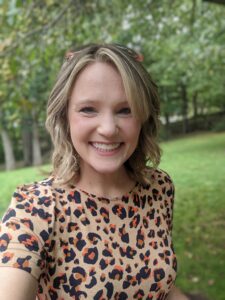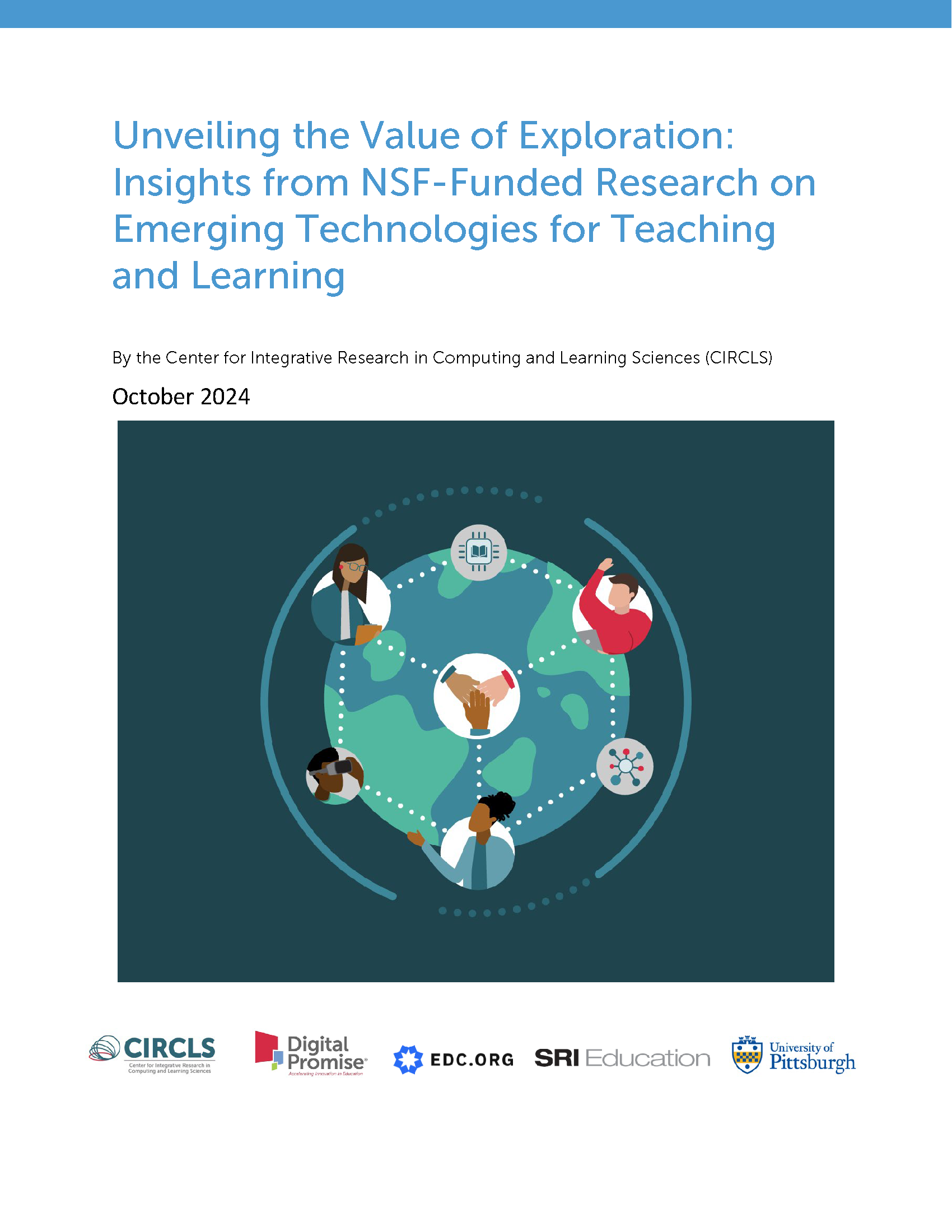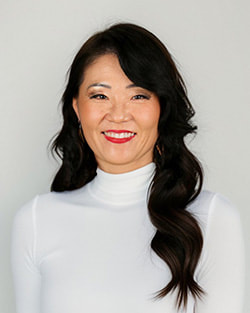Practitioner Reflections
Educators have been involved in CIRCL/CIRCLS since 2014. With many research projects focused on emerging technologies for learning, classroom and school-based practitioners in K-12 education are essential members of the community.
Practitioners have participated as co-designers, collaborators, and translators of research into practice. They have co-developed blog posts, professional learning webinars, and instructional resources, and participated in community expertise exchanges and convenings.
We asked Kip Glazer and Sarah Hampton, two practitioners actively engaged in Educator CIRCLS for multiple years, to reflect on their participation in CIRCLS, including the impact their participation has had on them professionally. Below are their insights.
Kip Glazer, Principal, Mountain View High School (California)
Why is participating in interdisciplinary, exploratory research interesting/impactful to practitioners?
As an educator and practitioner, I have always felt so strongly that we need to learn what the latest and most up-to-date researchers are discovering to perform our duties of serving our students well. I remember attending a CIRCLS convening in 2015, feeling frustrated that there weren’t enough classroom-ready projects for practitioners. Fast forward to 2024, I saw a remarkable evolution with so many incredible projects that I could see our staff and students benefiting from!
Such changes were possible because of the work of researchers who incorporated practitioner voices over the years to broaden impact. Because learning science focuses on advancing the science of learning, it is closely tied to educational systems. It is unimaginable that the end users, such as teachers and school leaders, are not a part of the exploratory phases of any learning science research. At the end of the day, what would be the point of working on advancing the field of research when the end users don’t receive the benefits? I am so glad to continue sharing my experiences and expertise as we work to improve learning for everyone!
What do educators value from attending CIRCLS convenings?
When I first attended the convening, I was a bit intimidated and overwhelmed by the brilliance I witnessed. However, connecting with such brilliant researchers and practitioners allowed me to gain new insights into the latest research projects. I found a group of like-minded people who could help me improve my craft. Still, I definitely felt my intellectual muscles being stretched by seeing the funded projects and speaking with the researchers who worked on them.
One of the most beneficial parts of the convening was meeting fellow educators who were searching for colleagues with understanding and passion for bringing research to their local contexts. I connected with so many researchers and practitioners around the country who taught me how their contexts influenced their work and how they had to adjust their implementation practices. Participation in the convenings has allowed me to have access to theoretical and practical knowledge to improve my own practices, and I have loved having the opportunities to partner with many beyond the convening whether it was to do a presentation together with them or write blog posts with them.
Sarah Hampton, Technology and Curriculum Specialist, Greenbrier County Schools (West Virginia)
 Why is participating in interdisciplinary, exploratory research interesting/impactful to practitioners?
Why is participating in interdisciplinary, exploratory research interesting/impactful to practitioners?
I love learning about more effective ways to teach and learn. When I first started noticing all the education research—all the journals, all the articles, all the learning experts and their work—I was honestly a bit discouraged. Here’s all this good work and it’s often not making its way into K-12 classrooms in a timely or transformative way. I’ve frequently thought about this problem like a reusable grocery bag that’s left in the car. The bag has the potential to help, but it can’t serve its purpose if it doesn’t make its way into the store. Education research has the potential to help K-12 education, but it can’t serve its purpose if it doesn’t make its way into schools. What can be done to bridge that gap? I participate in CIRCLS to help build the bridge by sharing my practical lens with researchers whenever I can and by bringing the research back to practice.
Teachers want what’s best for all of our students, and that’s difficult to do. Sometimes we don’t have the time or the bandwidth to help even when we want to. Knowing there are people consulting with practicing educators who are working on the challenging things makes me hopeful, especially because some exploratory projects are focusing on what works best for typical students and some projects are focusing on what works best for marginalized students. It makes me optimistic that we will learn better ways to help all our students as a result of this work.
K-12 educators often feel a disconnect between what’s happening in theory and what’s happening on the ground. As a math and science educator, I highly value scientific research and evidence-based practices, but it’s difficult to have confidence in research—even research from learning experts—when the end users weren’t included. When K-12 educators are included in projects from the onset, we know that scientific and practical expertises are represented and that the outcomes are more likely to succeed within the logistics of a K-12 classroom.
Learning about interdisciplinary, exploratory research brought an excitement and freshness to my teaching. For example, I learned about a project that developed an app that makes a phone’s sensor information visible. The next week I strapped an old cell phone to a remote control car, and my students tried to map a readout of the phone’s accelerometer to the car’s movements. We also dropped the phone from a ladder onto a couch so students could see acceleration due to gravity during free fall. As another example, I learned about a remote opportunity in which my students could sign up for time in an Australian lab manipulating the distance between a radioactive sample and a Geiger counter. They were able to discover the inverse square relationship in an authentic way that never would have been possible in our rural school because of the expense and danger. For a third example, I was able to help my students understand how to solve algebraic equations by building their intuition through gesturing because of a project I learned about and the app the PIs developed.
I’ve grown to respect and trust this community. It takes some of the guesswork out of identifying resources. It saves time when I’m looking for high-quality materials because I have a starting point I can count on.
What do educators value from attending CIRCLS convenings?
As an instructional coach, my favorite thing about CIRCLS convenings is learning about a wide range of resources and best practices that I couldn’t possibly accumulate from my own experiences. I think about convenings like a shopping spree at a hardware store. For a few days, I continuously stock my toolbox with high-quality tools. I may not have an immediate use for them, but, because they’re useful, there will come a time when I or another teacher needs them. When that time comes, I can quickly produce the right tool.
In addition, convenings provide an opportunity to think about upcoming complex challenges in education with experts who each bring their unique perspectives and experiences. Talking through issues before they become mainstream gives me insights and prepares me to navigate them more effectively when they do confront our district.
I appreciate meeting people who work on different aspects of education and learning about their projects. Plus, the 2023 convening intentionally included more educators, so I had the chance to meet other like-minded teachers and coaches. Building a network—knowing whose work to read, whose school has experienced similar challenges, or who to email when an issue arises—has been invaluable!


 Download the Report (PDF)
Download the Report (PDF)